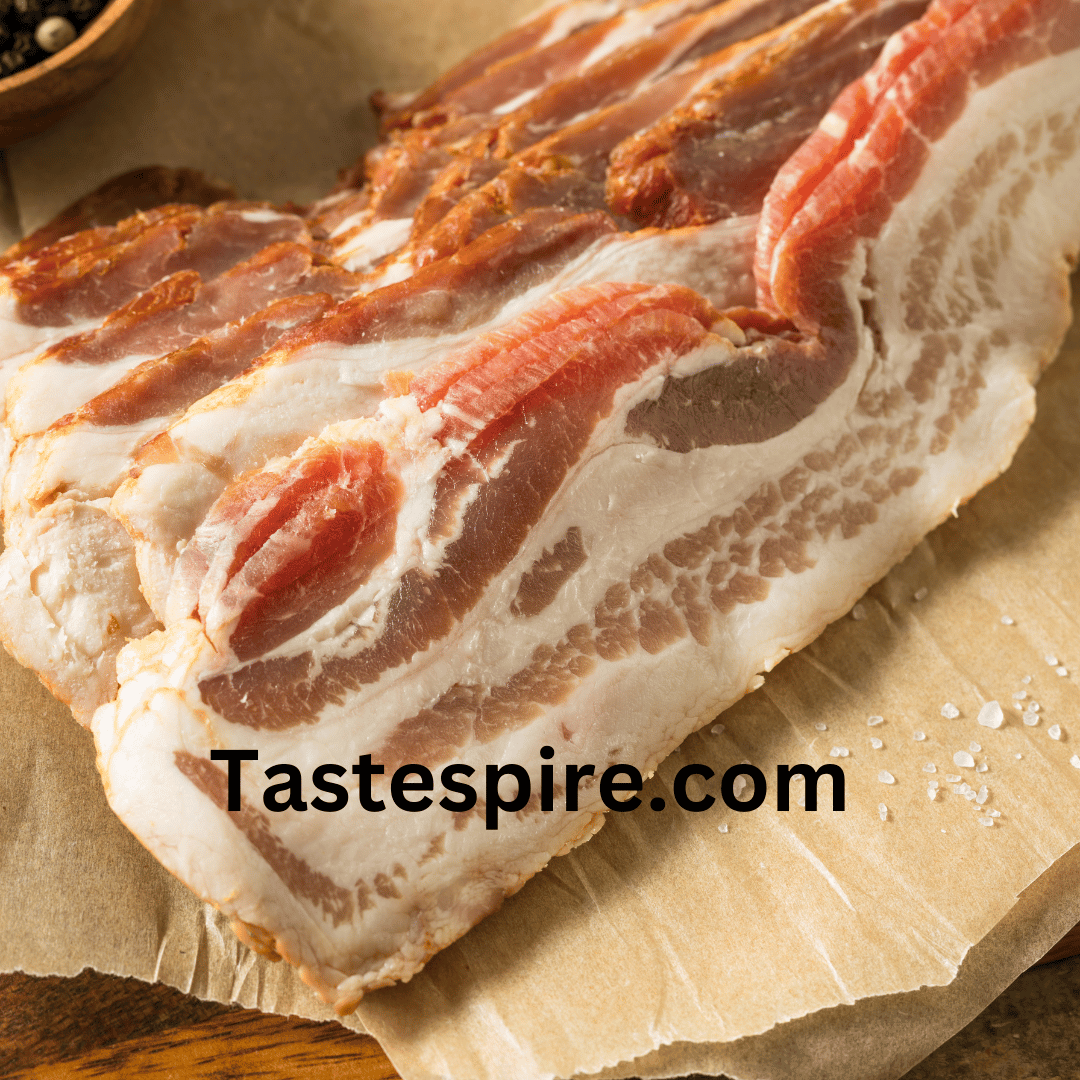Picture a world where our love for meat remains unshaken but our tastes are evolving. In the realm of gastronomy where preferences can be as diverse as the dishes themselves a question arises that What is uncured meat and how does it fit into our changing diets?
Meat enthusiasts have long debated the merits of cured and uncured varieties. This culinary tug-of-war is more than just a matter of taste it’s about making informed choices. In this article we embark on a journey of discovery and demystifying the concept of uncured meat.
Our goal? To equip you with knowledge dispel any misconceptions and provide a clear understanding of what uncured meat truly entails. Whether you’re a seasoned carnivore or someone seeking healthier dining options join us as we unveil the secrets behind the label and explore the world of uncured meat.
So without further waiting let’s delve into the savory world of uncured meat and unlock its delicious mysteries.
Table of Contents
Understanding Meat Curing

Curing meat is like giving it a special shield helping it stay fresh and tasty for longer. Let’s unwrap this idea step by step.
1. What is Curing?
- Curing is a magical process that makes meat last longer and taste better. It’s all about keeping meat safe to eat even when there are no fancy fridges around.
2. Way Back in Time
- People have been curing meat for ages even before refrigerators existed. Imagine our ancestors thousands of years ago using clever tricks to keep their meat from going bad.
3. The Curing Secret
- So what’s the big secret? Curing uses things like salt, sugar and special spices. These ingredients help suck the water out of the meat. When there’s less water harmful bacteria can’t grow and your meat stays fresh.
4. The Flavor Boost
- Here’s the fun part curing doesn’t just save meat it also makes it taste amazing! Think of your favorite bacon or ham that special flavor often comes from curing. It’s like a secret recipe passed down through generations.
5. A Longer Meat Life
- Cured meat can last way longer than fresh meat. So whether you’re an adventurer exploring the wilderness or just someone who loves delicious dishes curing has your back.
In a nutshell curing is an ancient trick that keeps meat fresh, tasty and ready to enjoy even when the fridge isn’t around. It’s a bit like magic for your meals!
What is Uncured Meat?

If you’ve ever wondered about the term “uncured meat” you’re not alone. It sounds like a mystery but we’ll unravel it for you in simple terms.
1. The Starting Point
- To understand “uncured meat” first you need to know about “cured meat.” Cured meat is like meat that’s been given a special treatment to last longer and taste unique.
2. The Missing Ingredients
- “Uncured meat” means it didn’t get the same treatment. It didn’t have those special ingredients like nitrates or nitrites which are often used in cured meat.
3. Natural Superheroes
- Instead of those special ingredients “uncured meat” relies on natural heroes like celery powder or juice. These natural guys have a superpower they turn into nitrites during the meat-making process. Nitrites are like little guardians that keep meat safe.
4. Fresh and Different
- So if you’re holding a slice of “uncured ham” or “uncured bacon” it means you’re about to taste something a bit different. It’s like the fresh untouched version of meat.
5. Your Choice
- Now you might wonder “Which is better cured or uncured?” Well it’s your choice! Some folks love the classic cured taste while others prefer the natural touch of uncured. It’s all about what makes your taste buds dance.
In a nutshell “uncured meat” is like the plain natural version of meat without some of the special ingredients. It’s a delicious choice for those who crave a different meaty experience.
Types of Uncured Meats
Uncured meats come in various delicious varieties. Here are some popular examples and how they differ from their cured counterparts:
Bacon:
- Cured Bacon: Cured bacon is preserved using synthetic nitrates giving it a distinct smoky and salty flavor.
- Uncured Bacon: Uncured bacon on the other hand relies on natural sources of nitrites like celery powder. It has a milder taste and a more pure bacon flavor.
Ham:
- Cured Ham: Cured ham undergoes preservation with synthetic nitrates contributing to its salty and classic ham taste.
- Uncured Ham: Uncured ham is preserved naturally often using a brine with celery powder. It maintains a simpler and less salty taste compared to cured ham.
Salami:
- Cured Salami: Cured salami typically made with synthetic nitrates offers the traditional savory and salty profile that salami lovers enjoy.
- Uncured Salami: Uncured salami relies on natural curing agents like celery powder. It provides a milder taste that highlights the meat’s natural flavors without the intensity of synthetic additives.
Prosciutto:
- Cured Prosciutto: Cured prosciutto with its salty and savory notes is a thinly sliced Italian ham often used in appetizers and sandwiches.
- Uncured Prosciutto: Uncured prosciutto follows the same natural preservation path resulting in a milder taste that lets the meat’s quality shine through.
These uncured versions not only offer a cleaner way to enjoy these meats but also provide a taste experience that showcases the meat itself without the overpowering flavors of synthetic nitrates and nitrites.
The Difference Between Cured and Uncured Meat
| Aspect | Cured Meat | Uncured Meat |
|---|---|---|
| Preservation Method | Preserved using synthetic nitrates or | Preserved using natural nitrates from |
| nitrites | celery juice or powder | |
| Health Risks | Linked to health issues when consumed in | Considered safer and healthier due to |
| large quantities | use of natural nitrates | |
| Taste | Distinct salty and smoky flavor | Milder taste |
| Production Process | Meat is rubbed with a mixture of salt, | Meat is rubbed with a mixture of salt, |
| sugar, and nitrites then hung to dry | sugar, and natural nitrates from celery | |
| and cure | juice or powder then hung to dry and | |
| cure | ||
| Examples | Bacon, ham, salami, prosciutto | Uncured bacon, uncured ham, uncured |
| salami, uncured prosciutto |
Why Should I Buy Uncured Meat?
When you stroll through the meat aisle at the grocery store you’ll likely encounter two labels “cured” and “uncured.” But why should you opt for uncured meat? Let’s uncover the reasons in plain language.
1. No Synthetic Additives
- The most significant selling point of uncured meat is what it doesn’t contain synthetic additives. Cured meats often use chemicals like sodium nitrite and nitrate which have raised health concerns. Uncured meat on the other hand skips these additives entirely.
2. Natural Preservation
- Uncured meat relies on nature’s toolbox for preservation. It uses ingredients like salt, sugar and spices along with natural nitrites from sources like celery juice or powder. These natural alternatives do the job without the synthetic additives.
3. Allergen-Friendly
- Some folks have sensitivities or allergies to synthetic nitrates and nitrites found in cured meats. Uncured options free you from worrying about these additives making it a safer choice for those with sensitivities.
4. A Different Taste
- Uncured meat offers a milder taste compared to its cured counterpart. If you prefer the pure unadulterated flavor of meat uncured is the way to go. It allows the meat’s natural taste to shine through.
5. Health Consciousness
- If you’re health-conscious and prefer to keep your diet clean uncured meat aligns with your goals. It generally contains fewer additives and is considered a cleaner option.
6. Transparency
- Uncured meat often comes with a transparent label indicating the absence of synthetic nitrates and nitrites. This transparency allows you to make an informed choice about what you’re putting on your plate.
7. Great for Nitrate-Free Diets
- Some people follow nitrate-free diets due to health concerns. Uncured meat is an excellent fit for these dietary preferences ensuring you can enjoy your favorite meats worry-free.
In summary choosing uncured meat is a decision driven by health-consciousness, taste preferences and dietary needs. It offers a cleaner more natural option that aligns with a variety of lifestyles. So the next time you’re shopping for meat consider going “uncured” for a healthier and more transparent choice.
Health Considerations

When it comes to your health it’s essential to understand the potential risks and benefits associated with your food choices especially when it comes to meat. Let’s delve into some key health considerations regarding synthetic nitrates, nitrites and sodium in both cured and uncured meats.
1. Risks of Synthetic Nitrates and Nitrites in Cured Meats
Cured meats have long been preserved using synthetic nitrates and nitrites. While these compounds serve as effective preservatives they’ve raised some health concerns:
- Cancer Risk: Research has suggested a link between the consumption of cured meats and an increased risk of certain types of cancer particularly colorectal cancer. This association is partly attributed to the presence of synthetic nitrates and nitrites which can form potentially harmful compounds when exposed to high heat during cooking.
- Nitrate Sensitivities: Some individuals may experience adverse reactions to synthetic nitrates and nitrites. These reactions can range from headaches to more severe symptoms. For those with nitrate sensitivities or allergies avoiding cured meats is often recommended.
2. Benefits of Choosing Uncured Meats
Opting for uncured meats can offer several potential benefits especially for specific groups:
- Nitrate-Sensitive Individuals: Uncured meats are a safer choice for those with nitrate sensitivities or allergies. By avoiding synthetic nitrates and nitrites individuals can enjoy meat without worrying about adverse reactions.
- Reduced Chemical Additives: Uncured meats generally contain fewer chemical additives. For those looking to minimize their exposure to synthetic compounds uncured options provide a cleaner alternative.
3. Addressing Sodium Concerns
Both cured and uncured meats can be sources of dietary sodium. High sodium intake is associated with health issues like high blood pressure. Here’s how you can manage sodium consumption:
- Moderation: Regardless of whether the meat is cured or uncured consuming it in moderation is key to controlling sodium intake. Be mindful of portion sizes to avoid excessive sodium consumption.
- Check Labels: Read product labels carefully. Some uncured meats may still have added salt contributing to sodium content. Choose products with lower sodium levels when possible.
- Homemade Options: Consider preparing your own uncured meats at home. This way you can control the amount of salt added during the curing process and tailor it to your dietary needs.
In conclusion your meat choices can impact your health. While cured meats with synthetic nitrates and nitrites come with potential risks uncured meats offer a safer option particularly for those with nitrate sensitivities. Regardless of your choice practicing moderation and reading labels can help you make healthier decisions regarding sodium intake.
FAQs
What exactly is curing in meat preservation ?
Curing refers to the process of preserving meat which has been practiced for centuries. It involves various techniques such as smoking, salting, fermenting and brining. These methods extend the meat’s shelf life reduce bacterial growth and enhance its flavor.
What distinguishes uncured meat from cured meat?
Uncured meat is preserved exclusively using natural ingredients like salt, sugar, spices and natural sources of nitrites and nitrates. In contrast cured meat relies on synthetic additives often sodium or potassium nitrites and nitrates which help preserve the meat and give it that characteristic reddish-pink color.
Are there health risks associated with synthetic nitrates and nitrites in cured meat?
Yes, there have been concerns about the use of synthetic nitrates and nitrites in cured meats. These additives have been linked to potential health risks including carcinogenicity and worsening asthma symptoms in some cases.
Who might benefit from choosing uncured meats?
Individuals with sensitivities to nitrate and nitrite additives should consider opting for uncured meats. These natural preservation methods can provide a safer and cleaner meat option.
What about sodium content in cured and uncured meat?
Both cured and uncured meats may contain sodium. While uncured meats may have a slightly lower sodium content it’s essential to monitor sodium intake especially if you have dietary restrictions related to salt.
How can I make informed food choices regarding cured and uncured meat?
To make informed decisions educate yourself about the labeling of meat products. Look for “cured” or “uncured” labels to understand how the meat has been preserved. Consider your health preferences and dietary needs when selecting meat for your meals.
Where can I find uncured meat products?
Many grocery stores offer a variety of uncured meat options including bacon, deli meats and sausages. Be sure to check product labels and explore different brands to find the uncured meats that suit your taste.
What are some delicious recipes using uncured meat?
Uncured meats can be used in various recipes from breakfast dishes like uncured bacon and eggs to sandwiches featuring uncured deli meats. Explore culinary possibilities and savor the flavors of uncured meat in your favorite meals.
Is uncured meat good to eat?
Uncured meat is a good option to consider especially if you have concerns about synthetic additives like nitrates and nitrites in cured meats. It provides a cleaner and more natural way of preserving meat which can be appealing to health-conscious individuals.
Is uncured better for you than cured?
Uncured meats are often considered a healthier choice for individuals who want to avoid synthetic nitrates and nitrites which have been associated with health risks. However whether uncured is better than cured depends on your specific dietary preferences and sensitivities. Both options can be part of a balanced diet but choosing uncured can provide a sense of reassurance for those with nitrate sensitivities or concerns.
Does uncured meat taste different?
Uncured meat typically has a milder taste compared to cured meat. The natural ingredients used for preservation in uncured meats like celery powder or celery juice do not impart the same intense smoky or salty flavors associated with synthetic nitrates and nitrites in cured meats. The result is a purer meat flavor that some people prefer.
Why is uncured healthier?
Uncured meats are considered healthier by some because they avoid synthetic additives like nitrates and nitrites which have raised health concerns. Natural preservation methods such as using celery powder offer a cleaner way to extend the meat’s shelf life. For individuals with nitrate sensitivities or those seeking to minimize chemical additives in their diet uncured meat can be a healthier choice.
Conclusion
In conclusion we’ve embarked on a journey to uncover the mysteries of cured and uncured meat. Let’s recap what we’ve learned:
- Meat Curing: We explored the art of meat curing a method that dates back centuries and its role in preserving meat, enhancing flavor and extending shelf life.
- What is Uncured Meat: We deciphered the concept of uncured meat which relies on natural ingredients for preservation steering clear of synthetic nitrates and nitrites.
- Health Considerations: We delved into the health considerations discussing the risks associated with synthetic nitrates and nitrites in cured meats and the benefits of choosing uncured options especially for nitrate-sensitive individuals. We also tackled concerns about sodium content.
It’s essential to grasp the significance of understanding what uncured meat truly means. Choosing uncured meat can offer a safer and cleaner option for those seeking to enjoy meat without the potential risks associated with synthetic additives.
As you navigate your culinary adventures I encourage you to explore the world of uncured meat. Make informed food choices that align with your health preferences. By doing so you can savor the flavors of meat while prioritizing your well-being.
So whether you’re sizzling up some uncured bacon for breakfast or crafting a delectable sandwich with uncured deli meats remember that knowledge is the key to making wholesome decisions in your culinary journey.
